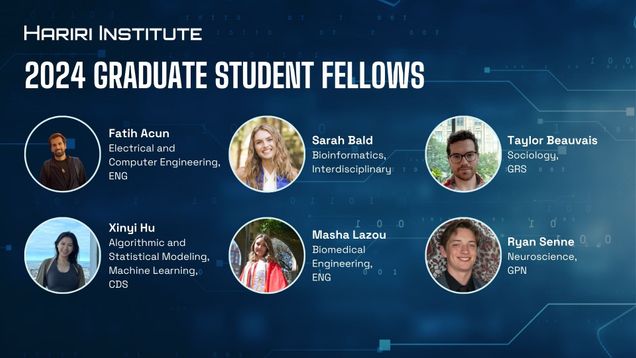Hariri Institute 2024 Junior Faculty Fellows and Graduate Student Fellows
Hariri Institute for Computing fellows are competitive awards granted to early-career faculty and exemplary doctoral students who are pursuing innovative computationally-driven research with the potential for high impact.
The Institute has awarded 8 Junior Faculty Fellows and 6 Graduate Student Fellows, representing early-career faculty and exemplary first-year and second-year graduate students who are pursuing innovative computationally-driven research with the potential for high impact. Our 2024 cohort of fellows represents a variety of colleges and schools across Boston University. They are applying computational methods and tools to address complex challenges in diverse fields spanning astronomy, biostatistics, economics, engineering, neuroscience, political science, sociology, statistical modeling, and speech, language & hearing sciences.
The Institute supports our junior faculty and doctoral student fellows by contributing to their research developments and connecting them with one another to lead Institute-sponsored events. These fellowships are three-year appointments.
Learn more about our 2024 Junior Faculty Fellows and Graduate Student Fellows below.

2024 Junior Faculty Fellows
Our 2024 Junior Faculty Fellows are:
Dillon Brout, Astronomy, CAS
Professor Brout’s areas of expertise encompass cosmology and astrophysics. His research goals are to understand dark energy, dark matter, and the dynamics, origin, and fate of the cosmos.
Jacob Brown, Political Science, CAS
Professor Brown’s research focuses on the role of geography in political behavior, using large administrative data sets such as national voter files and complex spatial data to analyze the effects of place and geographic context on individual voter turnout, ideology, and political participation.
James Chapman, Mechanical Engineering, ENG
Dr. Chapman’s research focuses on integrating machine learning methods with atomistic-level modeling to understand how materials behave under extreme conditions. He plans to use these insights to design next-generation materials for energy generation, energy storage, corrosion resistance, and pollution mitigation.
Huimin Cheng, Biostatistics, SPH
Dr. Cheng’s research focuses on the transformative power of computational thinking in scientific discovery. Her work integrates advanced statistical modeling, machine learning, and network science to unravel complex systems across domains.
Kimberly Crespo, Speech, Language, & Hearing Sciences, SAR
Dr. Crespo seeks to leverage network science approaches to examine how the structure of bilingual language input is reflected in the structure of bilingual children’s lexicons. Dr. Crespo’s work will be the first to examine semantic structure in bilingual late talkers and to model children’s vocabularies in both languages.
Brian DePasquale, Biomedical Engineering, ENG
Dr. DePasquale has sought to bring approaches from mathematics and machine learning to open questions in neuroscience, in order to broadly give insight into the relationship between the brain and behavior.
Masao Fukui, Economics, CAS
Professor Fukui’s research proposes new explanations for well-known empirical results in macroeconomics and finance. He performs quantitative evaluation of the idea in order to show the efficacy of the mechanism and evaluate potential alternative explanations.
Charlene Ong, Neurology, Chobanian and Avedesian School of Medicine
Dr. Ong’s work develops frameworks for medical record data extraction using Natural Language Processing, and utilizes the application of machine learning algorithms to improve risk prediction models.

2024 Graduate Student Fellows
Our 2024 Graduate Student Fellows are:
Fatih Acun, Electrical and Computer Engineering, ENG
Fatih’s research focuses on enhancing energy efficiency and sustainability in data centers by developing innovative methods that utilize complex datasets collected from large-scale computing systems. Fatih is also focusing on collaborative optimization methods across multiple data centers in order to enhance sustainability.
Sarah Bald, Bioinformatics, Interdisciplinary
Sarah’s research combines the analysis of large microbiome datasets with systems of equations for modeling complex microbial communities and aims at establishing a bridge between data-driven and mechanistic modeling.
Taylor Beauvais, Sociology, GRS
Taylor’s main interest is in investigating how technology is shaping culture, media, and social networks. Taylor’s current work focuses on critiquing, from a sociological framework, current practices in the field of critical data and algorithm studies, with the goal of developing relational algorithmic methods.
Xinyi Hu, Algorithmic and Statistical Modeling, Machine Learning, CDS
Xinyi is currently working on a project evaluating machine learning approaches to evaluate the predictive ability of structural and functional brain integrity on language recovery ability in post-stroke aphasia.
Masha Lazou, Biomedical Engineering, ENG
Masha’s thesis work is focused on the development of novel computational approaches for enhancing our understanding of protein-protein as well as protein-ligand interactions at a detailed molecular level as they relate to drug development.
Ryan Senne, Neuroscience, GPN
Ryan’s research centers around the role in brain function of astrocytes. Ryan aims to develop and apply sophisticated ML models that can dynamically relate neurons and astrocytes as they change from moment to moment in ways that are not yet fully understood.
Learn more about the Hariri Institute Fellows programs here.
